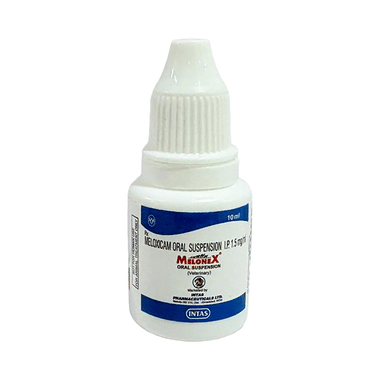Metaflam Pet Oral Suspension
 Prescription Required
Prescription Required Animal use only
Animal use only

Your pet's medicine at a glance
Give Metaflam Pet Oral Suspension exactly as directed by your veterinarian. It is best given with or after food to reduce stomach upset and improve absorption. Do not give more than the prescribed dose. To get the most benefit, make sure your pet stays well hydrated, follows any advised rest or activity restrictions, and attends all scheduled veterinary check-ups.
Metaflam Pet Oral Suspension is generally well-tolerated, but some pets may experience vomiting or diarrhea. These are usually mild and temporary. Stop the medicine and contact your veterinarian if your pet experiences any side effects that persist or worsen. Giving the medicine with food and keeping your pet hydrated can help reduce stomach upset.
Do not give Metaflam Pet Oral Suspension to pets that are allergic to NSAIDs (such as buprofen, naproxen, and aspirin) or have stomach ulcers, bleeding disorders, severe kidney or liver disease, or dehydration. The safety of this medicine in pregnant, breeding, or lactating animals has not been established; consult your veterinarian. Always inform your veterinarian about all medicines or supplements your pet is taking before starting treatment.
Uses of Metaflam Pet Oral Suspension in pets
Benefits of Metaflam Pet Oral Suspension for your pet
In Pain relief
How can I give Metaflam Pet Oral Suspension to my pet?
NA
How Metaflam Oral Suspension works
Safety advice
What if I forget to give Metaflam Pet Oral Suspension to my pet?
All substitutes
Quick tips
- Give Metaflam Pet Oral Suspension exactly as prescribed by your veterinarian. Never adjust the dose or stop treatment on your own.
- Always give with or after food to help reduce the risk of stomach upset.
- Ensure your pet has access to plenty of fresh water during treatment to help protect the kidneys.
- Attend all follow-up appointments for periodic blood tests, especially if your pet is on long-term treatment or has liver or kidney disease.
- Never give human NSAIDs (like ibuprofen or diclofenac) to your pet, as they can be dangerous or even fatal.
Fact Box
FAQs
What is Metaflam Pet Oral Suspension and what is it used for?
Can I give Metaflam Pet Oral Suspension to my cat?
Does my pet need blood tests while on Metaflam Pet Oral Suspension?
Are there important drug interactions or things I must avoid?
Can Metaflam Pet Oral Suspension be used in pregnant, breeding, or nursing animals?
Disclaimer:
Tata 1mg's sole intention is to ensure that its consumers get information that is expert-reviewed, accurate and trustworthy. However, the information contained herein should NOT be used as a substitute for the advice of a qualified physician. The information provided here is for informational purposes only. This may not cover everything about particular health conditions, lab tests, medicines, all possible side effects, drug interactions, warnings, alerts, etc. Please consult your doctor and discuss all your queries related to any disease or medicine. We intend to support, not replace, the doctor-patient relationship.References
Marketer details
Lab tests offered by us








